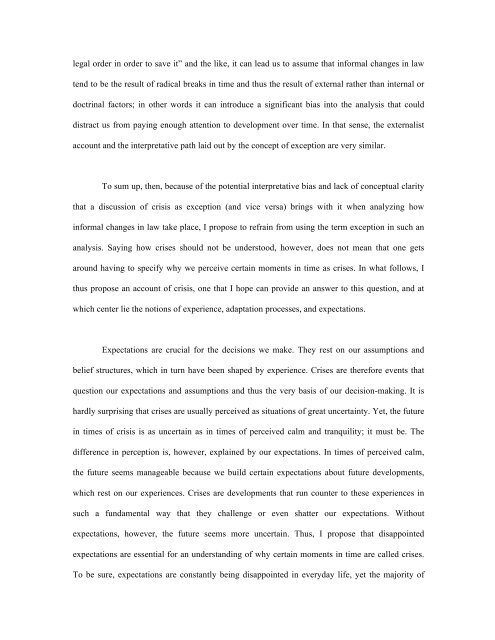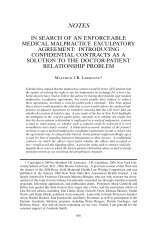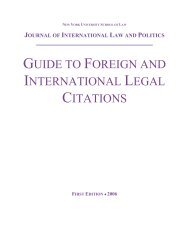Jasper Finke, Crisis and Law - New York University School of Law
Jasper Finke, Crisis and Law - New York University School of Law
Jasper Finke, Crisis and Law - New York University School of Law
You also want an ePaper? Increase the reach of your titles
YUMPU automatically turns print PDFs into web optimized ePapers that Google loves.
legal order in order to save it” <strong>and</strong> the like, it can lead us to assume that informal changes in law<br />
tend to be the result <strong>of</strong> radical breaks in time <strong>and</strong> thus the result <strong>of</strong> external rather than internal or<br />
doctrinal factors; in other words it can introduce a significant bias into the analysis that could<br />
distract us from paying enough attention to development over time. In that sense, the externalist<br />
account <strong>and</strong> the interpretative path laid out by the concept <strong>of</strong> exception are very similar.<br />
To sum up, then, because <strong>of</strong> the potential interpretative bias <strong>and</strong> lack <strong>of</strong> conceptual clarity<br />
that a discussion <strong>of</strong> crisis as exception (<strong>and</strong> vice versa) brings with it when analyzing how<br />
informal changes in law take place, I propose to refrain from using the term exception in such an<br />
analysis. Saying how crises should not be understood, however, does not mean that one gets<br />
around having to specify why we perceive certain moments in time as crises. In what follows, I<br />
thus propose an account <strong>of</strong> crisis, one that I hope can provide an answer to this question, <strong>and</strong> at<br />
which center lie the notions <strong>of</strong> experience, adaptation processes, <strong>and</strong> expectations.<br />
Expectations are crucial for the decisions we make. They rest on our assumptions <strong>and</strong><br />
belief structures, which in turn have been shaped by experience. Crises are therefore events that<br />
question our expectations <strong>and</strong> assumptions <strong>and</strong> thus the very basis <strong>of</strong> our decision-making. It is<br />
hardly surprising that crises are usually perceived as situations <strong>of</strong> great uncertainty. Yet, the future<br />
in times <strong>of</strong> crisis is as uncertain as in times <strong>of</strong> perceived calm <strong>and</strong> tranquility; it must be. The<br />
difference in perception is, however, explained by our expectations. In times <strong>of</strong> perceived calm,<br />
the future seems manageable because we build certain expectations about future developments,<br />
which rest on our experiences. Crises are developments that run counter to these experiences in<br />
such a fundamental way that they challenge or even shatter our expectations. Without<br />
expectations, however, the future seems more uncertain. Thus, I propose that disappointed<br />
expectations are essential for an underst<strong>and</strong>ing <strong>of</strong> why certain moments in time are called crises.<br />
To be sure, expectations are constantly being disappointed in everyday life, yet the majority <strong>of</strong>
















